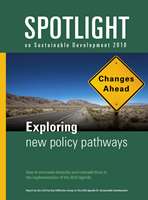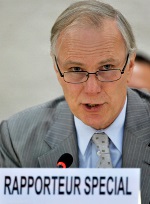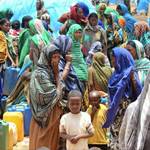Other news
Published on Fri, 2018-10-26 18:41
Rather than reaching the goal of ending hunger that is called for in SDG 2, the world is on track to increased and more exacerbated food insecurity. Since the adoption of the SDGs in 2015, global rates of food insecurity have increased – with some 815 million people facing hunger and malnourishment, and it is estimated that this number will continue to increase. The present understanding of the root causes of hunger and malnutrition and of the policy solutions that can support long-term, structural change, is not sufficiently up to speed with the kind of shifts that need to take place. A radical shift is needed. Eradicating hunger requires a radical shift from dominant food system models and development paradigms, towards addressing the food system as a whole, and creating enabling public policies that address key issues affecting food insecurity and malnutrition. Mainstream monitoring of food security and nutrition fails to address the critical questions around the social control of the food system, and in particular natural resources, and proposes solutions based on the current industrial model of production that feeds a global, and inherently unequal economy. |
Published on Fri, 2018-10-26 18:34
The aftermath of the Global Financial Crisis (GFC) which began in 2008 is still with us. The widespread macroeconomic downturn which followed the GFC's outbreak has been contained and growth of GDP has been restored, though not at rates which have repaired earlier losses. The post-crisis reform agenda is still being put in place but without a consensus as to the relative importance of different causes for the GFC and thus as to the importance of the different reforms required. The seriousness of the crisis in the autumn of 2008 had several manifestations. Global credit markets were no longer functioning. GDP in the United States was falling at an annual rate of nearly 7 per cent. The S&P index of US stock prices had fallen by 40 per cent. |
Published on Thu, 2018-10-25 14:58
Widespread privatisation of public goods in many societies is systematically eliminating human rights protections and further marginalising those living in poverty, according to a new report. Philip Alston, the UN Special Rapporteur on extreme poverty and human rights, criticised the extent to which the World Bank, the International Monetary Fund, and even the UN itself have aggressively promoted widespread privatisation of basic services, without regard to the human rights implications or the consequences for the poor. He also criticised human rights groups for not responding strongly enough to the resulting challenges. |
Published on Fri, 2018-10-19 18:32
Worldwide, more than half of the global population is not covered under any type of social protection scheme, and less than 30 per cent enjoys comprehensive social protection. Women are particularly disadvantaged in social protection systems, experiencing lower coverage rates and substantially lower benefit levels. This is due, in part, to the fact that social protection schemes have often been designed around a male breadwinner model, assuming an uninterrupted and full-time career in the formal economy. This tends to penalise women – who are significantly underrepresented in the formal labour market, over represented in informal employment, earn less than men, and experience greater interruptions in their careers due to caring responsibilities. As a result, women are often excluded from contribution-based schemes and leaving them completely unprotected in the absence of social protection floors. This brief by ITUC explores the policies that have been shown to be helpful in reducing gender gaps in social protection: which include measures to reduce barriers to women’s labour market participation, measures to tackle the gender pay gap, supporting the transition to the formal economy, crediting periods of care in social security contributions, and guaranteeing adequate, universal social protection floors. |
Published on Fri, 2018-10-19 18:20
A crisis in "multilateralism for trade" has been unfolding in the two years since the fourteenth ministerial meeting of the United Nations Conference on Trade and Development (UNCTAD), the head of the organisation, Dr Mukhisa Kituyi, has said. "One of the casualties appears to be progress at the WTO," he added. This came at a meeting of UNCTAD's Trade and Development Board (TDB) on 1 October, where Dr Kituyi, the Secretary-General of UNCTAD, presented the mid-term review report on the implementation of the Nairobi Maafikiano, the mandate that UNCTAD was given at UNCTAD-14 which took place in Nairobi, Kenya in July 2016. |
Published on Sat, 2018-09-29 00:00
The “Islas encendidas” meeting that will take place in Malaga, Spain 19-20-21 October will be an incredible opportunity to share knowledge and learn how to work together to built a sustainable and just society. We will address citizenship and the distribution of power: the challenges we face for a democracy truly governed by its people. We will ask ourselves about those who are entitled to have rights and address inequalities, discourses, borders and different forms of violence. We will discover new forms of citizen participation and political culture, social oversight practices and new forms of power. We will inspire each other to forge a new social contract combining diversity, sustainability and justice, incorporating the feminist approach. |
Published on Fri, 2018-06-15 14:54
If the International Monetary Fund (IMF) is to respond effectively in the years ahead to the challenges in a world in which both globalization and liberal democracy are increasingly under attack, it will need a different mindset from the modified neoliberalism that currently sets the parameters of its thinking. This is the assessment of Philip Alston, the Special Rapporteur on extreme poverty and human rights, in his latest report to the UN Human Rights Council, which begins its thirty-eighth regular session on Monday (18 June). |
|
Published on Thu, 2018-06-14 13:05
There are increasing warnings of an imminent new financial crisis, not only from the billionaire investor George Soros, but also from eminent economists associated with the Bank for International Settlements, the bank of central banks. The warnings come at a moment when there are signs of international capital flowing out of some emerging economies, including Turkey, Argentina and Indonesia. Some economists have been warning that the boom-bust cycle in capital flows to developing countries will cause disruption, when there is a turn from boom to bust. |
Published on Fri, 2018-06-08 13:58
This year is set to be an important milestone in the arduous journey of climate migrants. The global community is now beginning to fathom the challenges of people displaced by events such as floods, storms and sea level rise that are partly fuelled by climate change. Natural disasters forced over 18 million people out of their homes in 135 countries just last year, according to a new global report released by Geneva-based Internal Displacement Monitoring Centre (IDMC). |
Published on Tue, 2018-04-24 00:00
The inter-session climate talks under the UN Framework Convention on Climate Change (UNFCCC) will kick start in Bonn, Germany, from 30 April to 10 May. The two-week session will witness the convening of the meetings of the forty-eighth session of the Subsidiary Body for Scientific and Technological Advice (SBSTA 48), the forty-eighth session of the Subsidiary Body for Implementation (SBI 48) and the fifth part of the first session of the Ad Hoc Working Group on the Paris Agreement (APA 1.5). A key focus of the three bodies will be in making progress related to the completion of tasks concerning the implementation of the Paris Agreement (PA), known as the Paris Agreement Work Programme (PAWP). Various decisions regarding the modalities, procedures and guidelines necessary for the implementation of the PA are expected to be adopted later this year in December, in Katowice, Poland by the Conference of Parties meeting as the Parties to the PA (known as the CMA), which will also see the convening of the 24th session of the UNFCCC Conference of Parties, known as COP 24. |
SUSCRIBE TO OUR NEWSLETTER











